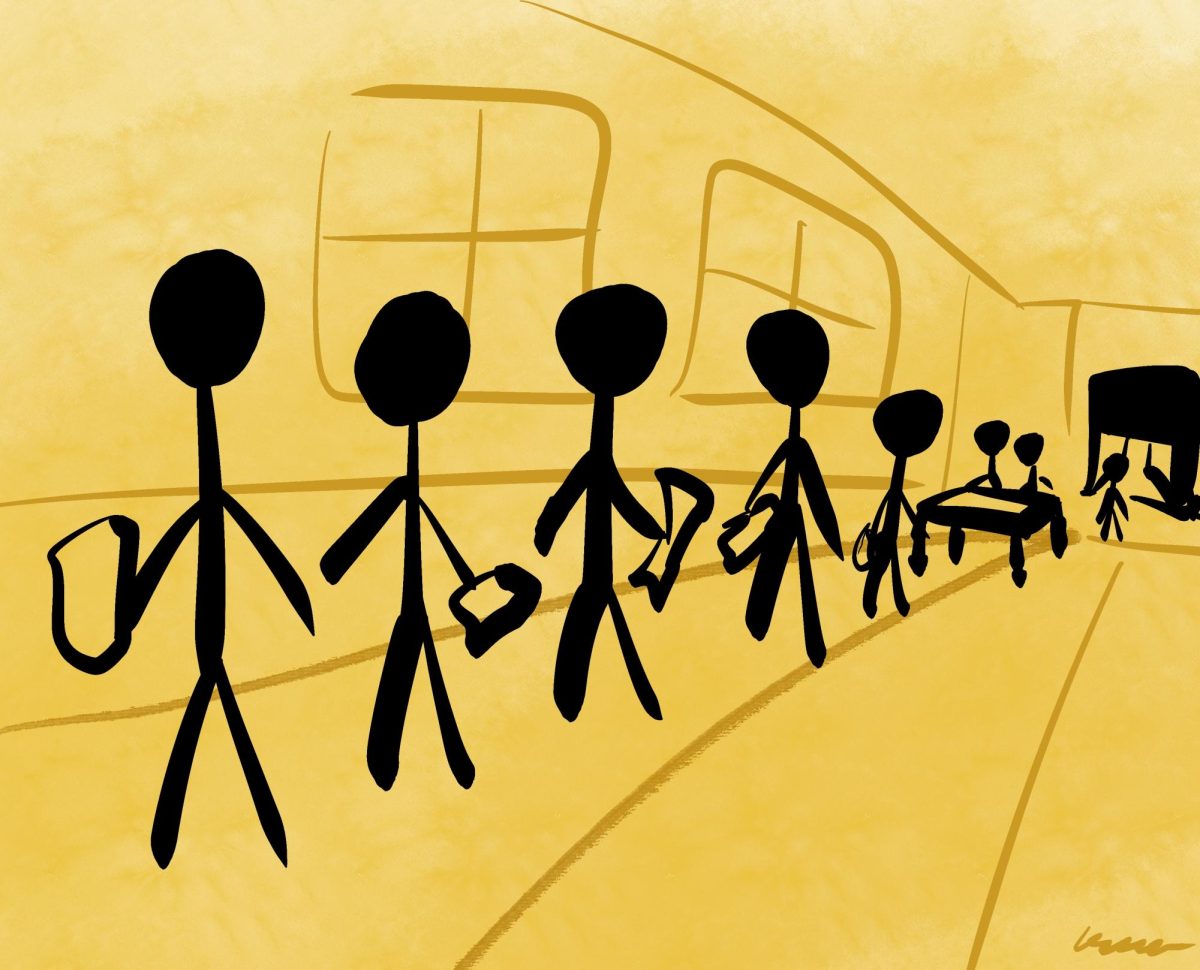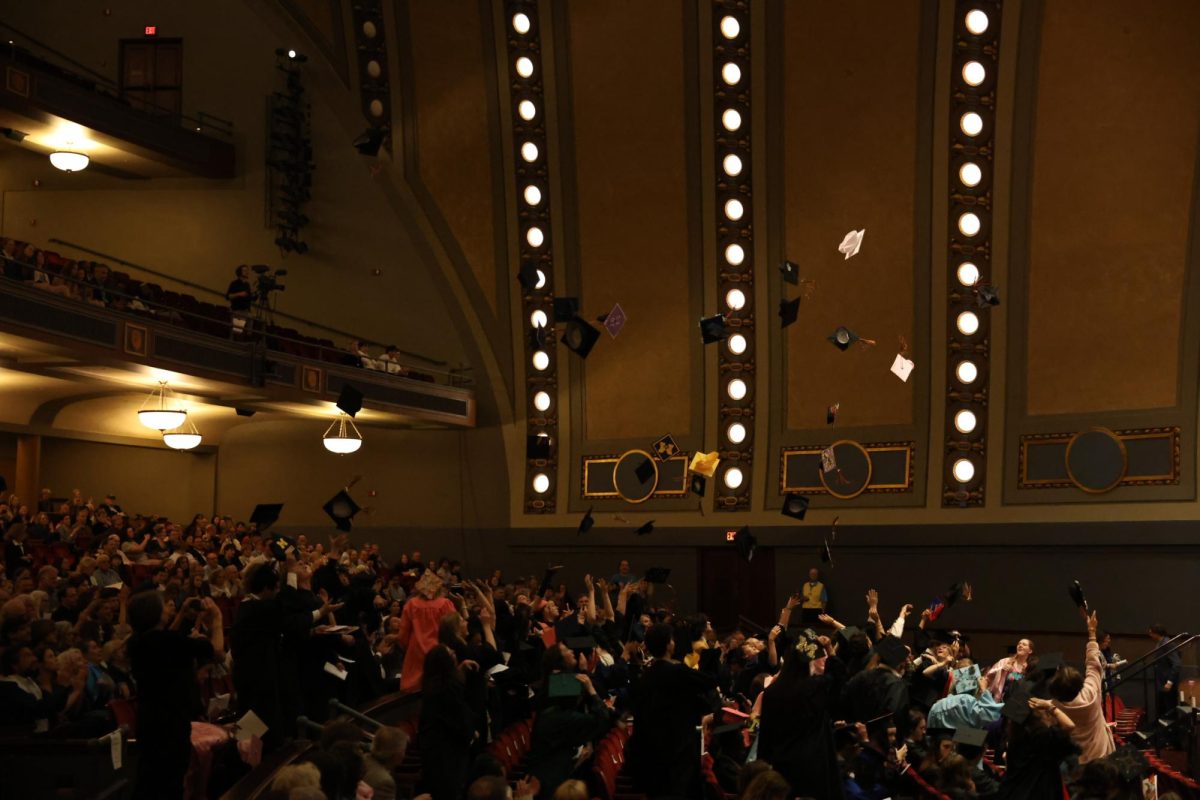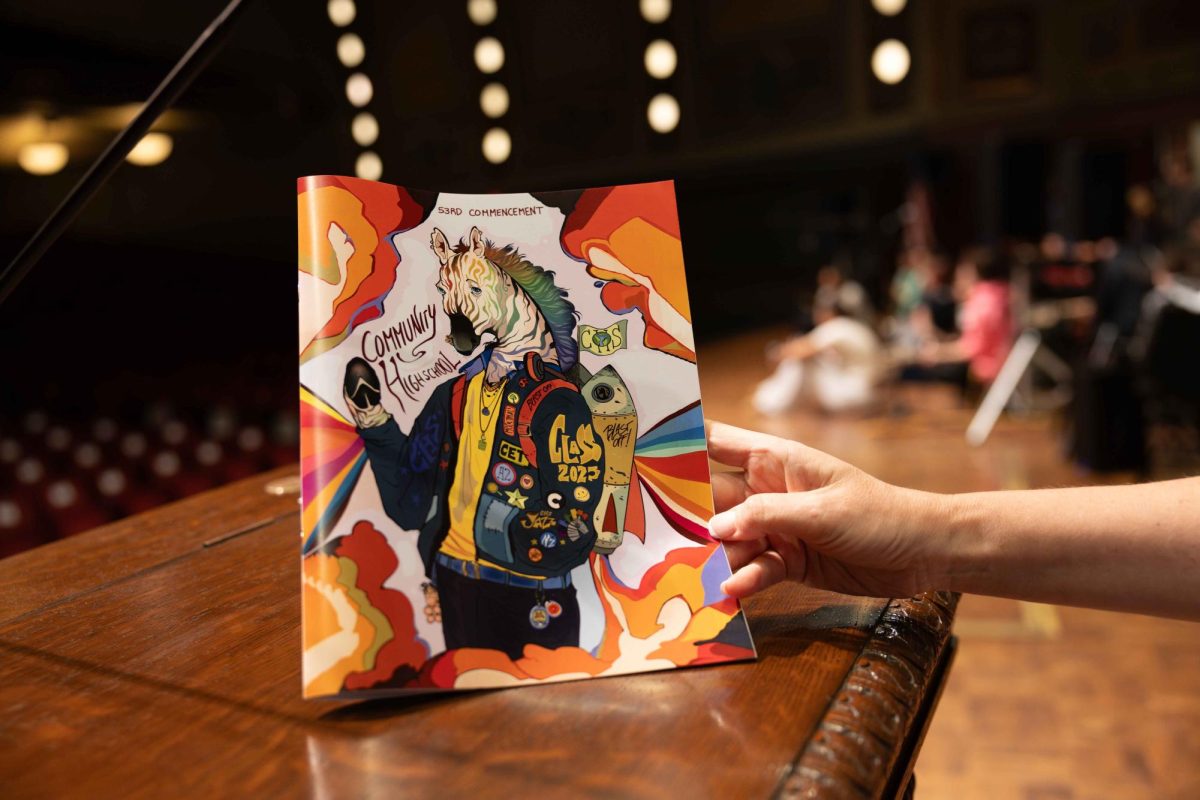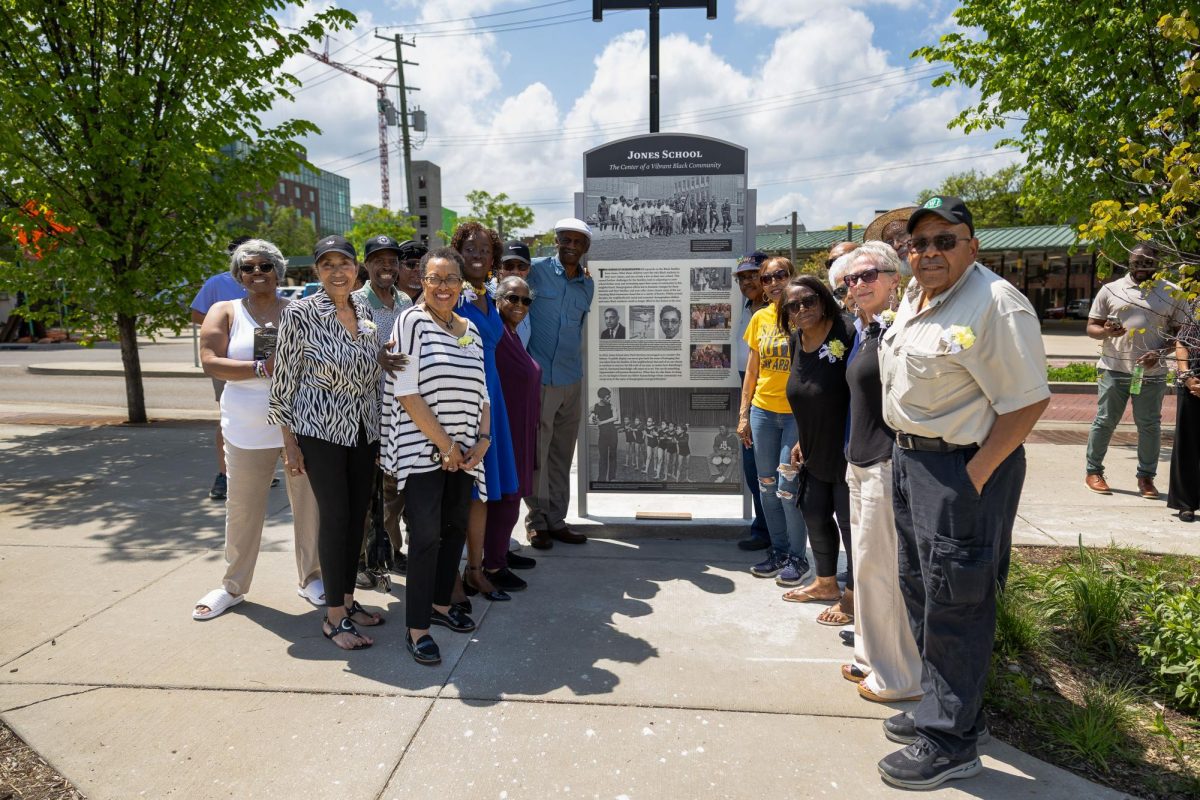Saying Goodbye
After three years of serving as Principal of a Seattle High School, Peter Ways quit. He had gotten into administration to create change, but was not finding success. He wanted to travel and find his calling, and so the current Dean of Community High School took a year off.
Living in Seattle, Ways had been exposed to Native American practices and rituals. He had participated in sweats, spiritual practices of entering a stifling tent, chanting and praying. He had heard as well about vision quests, where adolescents complete a rite of passage to determine their life’s purpose.
“I think that my career had been very accelerated up to that point,” said Ways. By age 33, he was a principal of a comprehensive high school and decided to have a “vision quest” for himself. “I wasn’t fulfilled. I felt like [a year off] was a unique and fortunate opportunity to take.
“I did a lot of exploring and activities,” he explained, “It ranged from soul searching and reflecting to reading and meeting.”
As Ways dove into volunteering and trying new activities, he began to discover his goals in life – goals that would shape and predict the career he continues today.
DISCOVERING THE MISSION
When Ways was 9, his parents divorced. He became distant from his father, had bad self-esteem and did not have many people to talk to about the issues in his life.
“As I entered my teenage years, I don’t think I was particularly depressed. But I don’t think I had a good self-concept,” Ways said.
Through a family friend Ways met a youth minister at an Episcopal church. The priest became a significant part of his life, substituting in for Ways’ father.
Ways’ mentor did a lot of work with young adults. He took them on camping trips and programs, adventures and travel, but more importantly he engaged them in conversation. “It wasn’t particularly church-driven or religious,” said Ways. “We talked more about issues than God.”
The conversations Ways had with his peers and the youth minister changed his self-image. “He helped me realize that I was a good person, and that I had things to offer, and I was unique,” said Ways. “And I think he did that for a lot of people. It was sort of like a transformation … just this notion that I had something to offer the world.”
Along with self-concept, Ways learned about life. “You can go to school and never learn about relationships, communication, honesty, how to deal with big emotions,” he said. “That’s the step he helped me learn about. I think I wanted to help other people learn about that.”
With this past in mind, Ways volunteered with youth during his year-long vision quest. He helped schools distribute donated money productively. Besides volunteering, Ways took time to meditate on his past, present and future. He spent a week in an island in the Pacific Northwest alone in the winter with no electricity. “It was not like snow and ice, but it was dark and cold,” said Ways.
Finally, he took a train ride coast to coast across the United States, and had important conversations with people in his life.
When Ways began his vision quest, he had no idea how it would turn out. “I was trying to wipe clear the expectations … I wanted to try to build back what seems most important to me.”
After some time, he realized his future would take the same path as his childhood mentor. The issue for Ways was that he was not particularly religious. “I couldn’t really figure out how to make that work,” said Ways. “I did ultimately decide that you could have a ministry of sorts, although you probably wouldn’t use that word often, in public education.”
Ways wanted to have the same powerful discourse with young adults that he had in his youth. “[The minister] was a model for how I could engage young people in more authentic ways,” he said. “The youth minister part of it sounds like religion but really it’s an avenue to have more authentic and deep and meaningful relationships with young people.”
After his vision quest, Ways drew closer each year toward his goal, changing positions frequently to fulfill his ministry aspirations.
After his spiritual year, Ways got into organic farming. It was almost the furthest he could be from students, and in Scio Township he worked every day from March to November without a break. He did not like the odds of supporting himself on a farmer’s income, so he began consulting work for the Ann Arbor Public Schools.
The AAPS was dealing with overcrowding. They wanted a bigger high school that would incorporate new educational philosophies and programs. The school district hired Ways. Within the year he took over the position as acting administrator for secondary education. He spent a year working on the bond that built Skyline High School, overseeing new technology, new strategies and refurbishment of all the other high schools.
Next, Ways was the administrator of technology services. After three years in the AAPS, Ways had three jobs. He was still quite distant from student interaction. Then, the Dean position at Community High School opened up in the summer of 2006. There was not time to conduct a new dean search, so Ways took on an interim role. In 2007, a committee of staff, students, parents and administration completed a detailed hiring process and decided to have Ways remain.
SEEKING BALANCE
In his office of Community High School, Ways gestures to a white board leaning against a wall. It was for the 2007-2008 school year, he says. On the left side, he explains, are tasks he has to do. On the right side are tasks he wants to do. Both sides are full, additional words sprawling and crammed on the edges.
Although Ways has help from the staff, he is responsible for the entire board (see box). Although administrators are supposed to have a one to six or one to ten ratio to the staff they oversee, 45 people report to Ways for evaluation. While each staff member does not get evaluated every year, this is still a much larger ratio than desired.
As Dean, Ways typically works 60 hours a week, but even that is not enough for the task he has to do. “I don’t have time to do the stuff that I want to do. I just have time to do the stuff that I need to do, and I don’t even get to all of that,” says Ways. When he began his tenure as Dean he hoped to improve technology, activities, student government and help to make the school more environmentally friendly.
Despite all the tasks on the white board, Ways also tried to make time for the students in the building. “People could be more efficient than me,” Ways says. “I spend a fair amount of time walking around the school talking to people. If I just sat in here and crunched the stuff all the time I could probably get a lot more done.”
When Ways arrived as nterim dean in 2006, he had a lead teacher, Danelle Mosher, who acted as an assistant. He described his first year at the school as a “honeymoon,” and expected that the Dean of CHS would not function as a typical principal role. “I just loved the staff and the students and I was excited about doing all sorts of initiatives,” he said. “It was a fairly smooth year.”
In some ways, the position was not like an ordinary principal job. Ways noted that the culture of the school was different, and that his interactions with students were more relaxed and less authority-based. However, after his smooth start Ways realized that “70-80% is really the principal job.”
After Ways became permanent Dean, his job became a lot more challenging.
It started with the retirements. Roughly eight staff members took buy-out packages. The rearrangements left CHS with the equivalent of 2 full-time positions cut. Next, Ways began year two without a lead teacher. He got the help of retired faculty like former Dean Judy Conger, Vicky Henry and Mike Alperovitz, but it was not the same.
“It definitely takes two people to do the dean job,” said current lead teacher Marci Tuzinsky. “Judy had no lead teacher for one semester and it was the hardest semester of her life.”
Ways was responsible for the new staffing, taking account the lost positions. This led to heated political run-ins with the staff about curriculum and new teachers. Ways read a book called “The Different Drum: Community Making and Peace,” by Scott Pecks. From this, he learned “there’s this period of time where everyone’s nice to each other. Then you descend into chaos, and you emerge as much stronger.”
Ways felt that was what he and the staff went through. “We got into really hard issues, and we came through pretty well. I credit some of the staff about taking the high road,” he added.
Year two also came accompanied with a racial incident. “There was … [a] focus on if CHS is a good place for African American people. It’s been a pretty painful question to face ever since,” he said.
Senior Dylan Cinti says that Ways addressed those issues. “He encouraged reading Malcolm X’s biography in C-RAD’s (Committee on Race and Diversity) separate book club.” Ways tried as well to focus Not School as Usual Days on conversations about diversity.
SEARCHING FOR PEACE
Ways has never stayed in one position for more than several years. By the fall of 2008, he had long considered stepping down from the Dean position.
Then, the new school year offered more challenges. Marci Tuzinsky stepped in as lead teacher to help alleviate the workload, but events out of CHS staff control began to happen.
In the fall, a felon running from police hid in the CHS Dance Body room. Then, a fire in the bathroom occurred in early January. Both prompted questions as to the safety of the building and students.
Liz Margolis, Director of Communications for the AAPS, worked with Ways on the safety issues. “None of those things are normal, but they are normal to happen. You have to expect them happening,” she said.
Illness also struck the staff and community of CHS. Ways’ nephew, Nick Breakey, was diagnosed with leukemia as well as Anne Thomas’ daughter Emma. Teachers Liz Stern and Deborah Sipos-Roe battled cancer, and John Patrick died. “[There are] huge emotional life and death issues going on,” said Ways.
Ways explained that some people have emotional boundaries when they enter a job, and can differentiate their feelings about work and home. It is a sought-after quality for some administrative positions which he says he lacks. “If somebody comes at me, and they’re really distressed and really upset, I tend to get somewhat upset and distressed,” he said.
The cancer, deaths and safety issues began to tax Ways. “I’m personally responsible for 600 people and anything can happen,” he said. “I think on a human level, I have felt very worn out. I mean, I want to do it. I want to be there for people, but there’s not much left of me sometimes when I get home.”
When Ways visited his sister in Seattle, he noted that their family had dinner together every night and then relaxed after. While Ways says he has quality time with his partner and daughter now, it is always “rushed and compact.”
Even at home, Ways never stops thinking about Anne’s daughter and Patrick’s death among all the other issues. “That stuff just weighs on me,” he said. “It’s what I dream about at night.” He added, “There’s no way I’m going to feel that peace and be dean or principal anywhere.”
Most of the setbacks that occurred were not anyone’s fault. Tuzinsky says Ways and the staff have otherwise done quality work. “When I say it’s been a good year, it’s been a good year for the things we have control over,” she said.
Ways has enjoyed the times when he can leave his office and be a part of the school community. Cinti recalls spending hours with Ways and other students plotting a new student government, one that would truly represent CHS.
The result, Forum Council, now meets regularly and planned the 2008 Multi Culti Feast. “I love Forum Council and empowered students,” Ways said. “I think that this school can be an activist school … I just think that people are really worn out getting the academic work done.”
Cinti has been affected by Ways’ enthusiasm. “His involvement and activism is really inspiring,” he said. “I think he also forces us to take charge and admit our mistakes, and have a lot of initiative. And I think he has a ton of initiative, so part if it is just matching that.”
Besides Forum Council, Ways is also proud of the million-dollar renovation he oversaw, helping to stretch the money as far as it could go. In addition, he mentions his work organizing the state-mandated MME and ACT.
Ways believes there is more activist work that needs to be done. This year at CHS, he has been the only out LGBTQ (Lesbian, Gay, Bisexual, Transgender, Queer) staff member in the building. “That actually has been something I did not expect and that has not been real comfortable for me,” he said.
He says the Riot Youth Climate Survey done at the Neutral Zone would point to areas in which CHS could improve LGBTQ-related issues for students and staff.
COMING FULL CIRCLE
Toward the end of his third year at CHS, Ways called his supervisor and Joyce Hunter to discuss his future. After they guaranteed him a teaching job, he announced his decision to leave CHS in the next 48 hours.
Ways realized that to fulfill his vision quest, he would have to have more frequent interactions with students than any administrator could. He also wanted to work less than 60 hours a week and have more time with his family.
The issues he has dealt with are hard, but he does not regret taking the Dean position. “I think that the combination of events in the last couple years maybe shortened my tenure here. … But the truth is, I love Community High. I’m on great terms with the staff, and in that sense I don’t want to leave.”
Tuzinsky says part of what made him a good fit for CHS is also why he wants to do something different. “He’s a very self-reflective person and he’s very honest … What made Peter so great is also what made him burn out.”
Ways had his choice of positions but ultimately decided to take a job teaching English and Social Studies to 7th and 8th grade students at Ann Arbor Open. Cinti is sure the change will not be difficult. “More than one person has called [Ways] a sort of chameleon,” he said. “He can transition well into any role.”
Vision quests, according to Native American culture, are focused on more than just a life mission. In the end, participants are encouraged to find truth, balance and peace. Ways’ path towards teaching would allow him to do this.
What he is most looking forward to, however, are the relationships he will form with students. Just like his childhood mentor, he hopes to have important conversation. “As their teacher I think I’d get to know them much better,” Ways said. “And I think it’d be much richer, and have more of a potential impact for both of us.”









